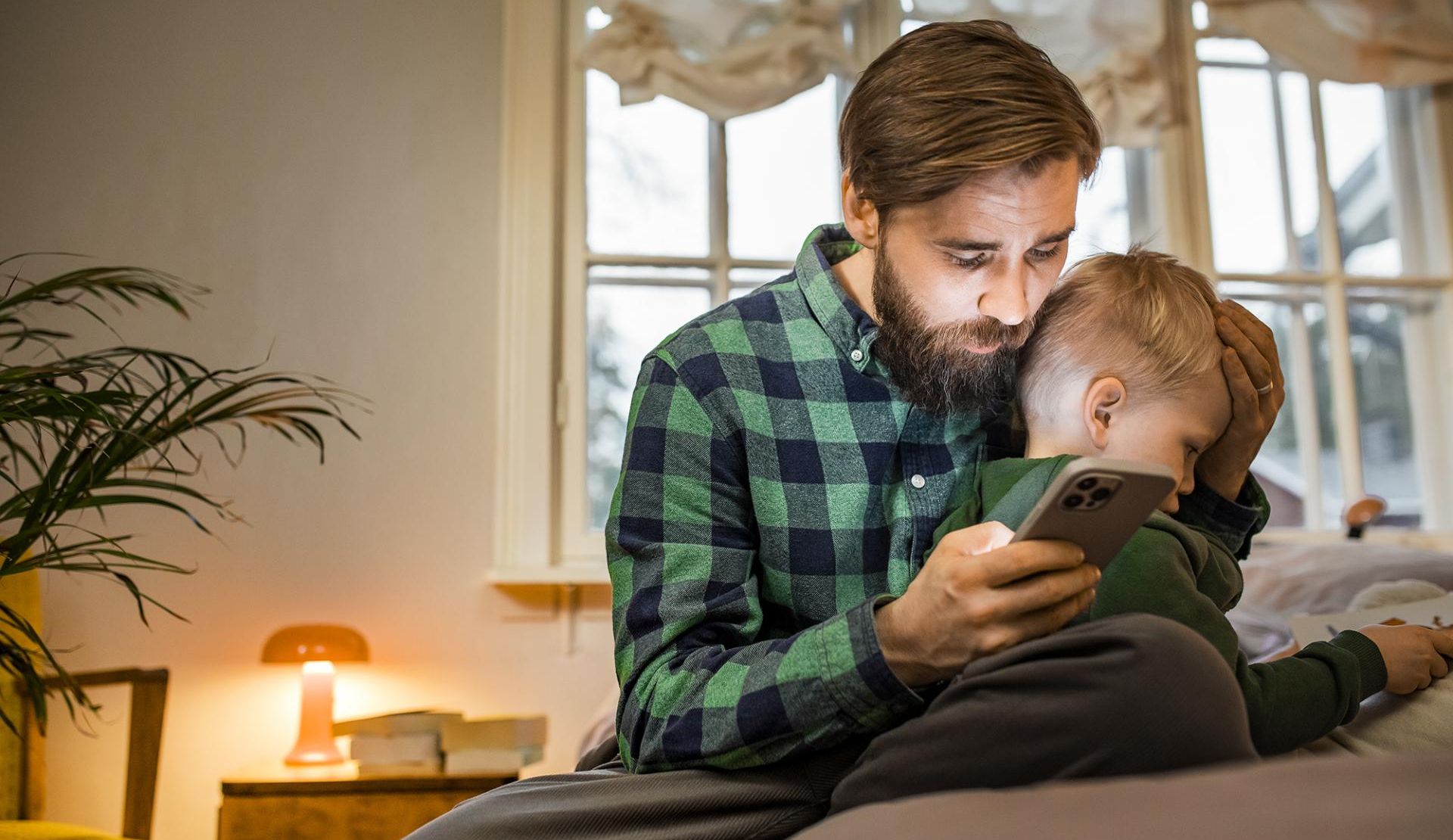
Looking to get rid of pinworms? If eradication is not successful, our doctor will help
Specialist in the article

Revised 6/1/2023
If your child's bum is itchy and the anus is red, this may be due to pinworms. This harmless and common ailment of families with children is treated with prescription-free medication, but if the problem is persistent, the treatment of pinworms may require medical help.
Basic facts about pinworms
- The eradication of pinworms is usually successful with prescription-free medication.
- If the problem persists or your child's skin is infected from scratching, book an appointment with our paediatrician.
Services
Mehiläinen's paediatricians are here to help you if pinworms are a problem for your family.
Book an appointment with a paediatricianOur general practitioners can also help small patients.
Book an appointment with a general practitionerDo you have any questions about pinworms? Our Digital Clinic is a quick and easy way to get answers.
Remote appointments can be used to treat symptoms and diseases that do not require a physical examination.
Go to Digital ClinicConsult the Digital child health clinic to ask questions about your child’s care or parenting. Qualified midwives and nurses provide support 24/7, either for a one-time fee or a fixed monthly fee.
Learn more about the Digital child health clinicPinworms – how to recognise the symptoms
Pinworms are not harmful to health, but they can make a child feel unpleasant. These signs and symptoms may indicate that your child has a pinworm infection:
- Itchy bum, especially in the evenings and at night
- Itching in the vagina
- Restless nights due to bothersome itching Bedwetting in some cases
- Irritated and reddish genital area
- Abdominal pain
- Light, shuttle-like pinworms 3–13 mm long visible in the stool or at the anus, where female pinworms migrate to lay eggs at night.
If, despite the symptoms, you cannot see pinworms, the child may undergo a pinworm test for laboratory analysis. Our doctor will give further instructions.
Pinworm infections are easily transmitted in daycare centres and schools
There is no need to panic about pinworms that live in the human intestines, as they are a harmless and common ailment in families with children attending daycare and schools.
Your family may be infected even if you take care of your child and clean your home.
Infection occurs when the eggs of the pinworm enter the mouth. Inconspicuously small pinworm eggs spread from person to person through hands, bedding, toys or door handles.
Pinworm infections are common in children, but adults can also become infected.
Pinworms – medication, cleaning, laundry and new bedding
The treatment of a pinworm infection is simple, but requires some effort. Here's how it works:
Prescription-free pinworm medications are available from pharmacies. Treat the whole family at the same time – including asymptomatic family members. Repeat the treatment after two weeks to ensure that the eradication is successful.
Change your bedding and clean the home the next day – after both treatments with medication. Regular cleaning is enough, but pay special attention to the toilet and door handles.
Wash the bedding, towels and underwear at a minimum temperature of 60 degrees. Also, wash the plush toys the child sleeps with or put them aside for a few days so that any worm eggs on them die.
Remind the child to wash their hands every time they go to the toilet and before eating. Cut the child's fingernails so that the eggs of the worm do not accumulate under the fingernails and cause further infections.
You can relieve the itching of the child's bum by spraying the area around the anus with water – this also flushes the worms down the drain. Irritation of the skin and mucous membranes can be eased with moisturising creams available from pharmacies.
Tell the daycare centre or school about the worm infection so that the worms are not transmitted from one child to another.
Pinworms may feel disgusting or scary. You can reassure your child by telling them that this is an ordinary and harmless condition that they do not need to be embarrassed about.
Eradication of pinworms – seek medical attention if symptoms persist
Eradication of pinworms is usually successful and the itching often eases already after a couple of days after taking the medication.
In some cases, the eradication of pinworms does not succeed and they may remain a nuisance despite the treatment.
If the symptoms persist, you can try the medication again. If that does not help either, turn to our doctor – you may need a prescription medicine to eradicate the pinworms.
In children, the genital area may become inflamed due to scratching at night. In this case, it is best to seek help from a doctor.
The expert for this article was our paediatrician Maria Enlund-Cerullo.
Prices for appointments with specialists, such as gynaecologists, dermatologists, cardiologists, orthopaedists and ophthalmologists, can be found in our appointment booking service.
| Service | Price estimate |
|---|---|
| Appointment with a specialist, 20 min Price per appointment. | from 140,10 € Without Kela reimbursement from 148,10 € |
| Appointment with a specialist, 30 min Price per appointment. | from 163,10 € Without Kela reimbursement from 171,10 € |
| Appointment with a specialist, 45 min Price per appointment. | from 199,10 € Without Kela reimbursement from 207,10 € |
| Gynaecologist's appointment, 20 min | from 83,10 € Without Kela reimbursement from 153,10 € |
| Gynaecologist's appointment, 30 min | from 90,10 € Without Kela reimbursement from 160,10 € |
| Dermatologist's appointment, 20 min | from 144,10 € Without Kela reimbursement from 152,10 € |
| Dermatologist's appointment, 30 min | from 159,10 € Without Kela reimbursement from 167,10 € |
| ENT doctor's appointment, 20 min | from 142,10 € Without Kela reimbursement from 150,10 € |
| ENT doctor's appointment, 30 min | from 166,90 € Without Kela reimbursement from 174,90 € |
| Paediatrician's appointment, 20 min | from 142,10 € Without Kela reimbursement from 150,10 € |
| Paediatrician's appointment, 30 min | from 166,90 € Without Kela reimbursement from 174,90 € |
| Orthopaedist's appointment, 20 min | from 142,10 € Without Kela reimbursement from 150,10 € |
| Orthopaedist's appointment, 30 min | from 166,90 € Without Kela reimbursement from 174,90 € |
| Appointment with a psychiatrist, 45 min Price per appointment. | from 123,70 € Without Kela reimbursement from 173,70 € |
| Appointment with a psychiatrist, 60 min Price per appointment. | from 172,10 € Without Kela reimbursement from 232,10 € |
| Ophthalmologist's appointment, 30 min | from 166,90 € Without Kela reimbursement from 174,90 € |
| Ophthalmologist's appointment, 45 min | from 222,10 € Without Kela reimbursement from 230,10 € |
Related symptoms
Children's sleep problems are manageable – a pediatrician supports the whole family
Ear infection in children and babies
Fever in children – our doctor can help if home remedies do not work or the fever persists
Hand, foot and mouth disease in children
Head lice – if getting rid of head lice is not possible at home, you can seek help from a doctor
Meningitis in children and babies—how to recognise alarming symptoms
Mononucleosis – uncomfortable symptoms and fatigue can make life difficult for a long time
Other related services
Dental check-up for children and young people
Specialist dental check-up visit for children and adolescents.
Paediatric physiotherapy
Rehabilitation provided by a physiotherapist that aims to promote the child's functional capacity and mobility.
Vaccinations for babies and children – Frequently asked questions
Frequently asked questions about pinworms
Pinworms are light-coloured, 3–13 mm long, fusiform parasites that resemble a piece of thread.
An infection occurs when the eggs of pinworms enter the mouth. This usually occurs by coming into contact with the hand of an infected person or by touching bedding, toys and clothes.
The egg of a pinworm develops into a pinworm in about six weeks. Since the infection is transmitted through eggs, it also takes six weeks from the infection to the appearance of symptoms.
If your child's bum is itchy in the evening or at night, they may be infected with pinworms. The child's skin around the genital area may also be red. You can see the pinworms in the child’s stool or around the anus.
Most people with a pinworm infection are asymptomatic, so you may not notice the infection yourself. An infection can be verified with a laboratory analysis.
Pinworms are rare among children under two. If there is a pinworm infection in your family, you should treat the whole family at the same time – including asymptomatic family members.
If your child has a lot of pinworms, you may see them in the stool.
